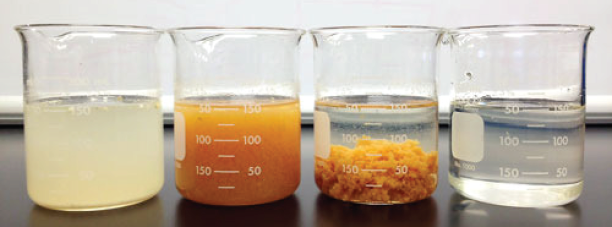GWT Zeoturb Bio-Organic Water Treatment Flocculant Comparison to Metal Salt Coagulants & Polymers for Drinking Water & Wastewater Clarification

Do you want to learn how to reduce overall operating cost of your utilities or companies water or wastewater treatment operations?
In this article, we will provide a unique reference chart to compare the innovative Zeoturb bio-organic powder water treatment flocculant with convention metal salt coagulants and polymers.
These metal salt coagulant consisted of Alum, Polyaluminum chloride (PAC), Ferric Chloride (FeCl3), and synthetic available polymers.
Comparison Points | GWT Zeoturb(tm) | Synthetic Polymers/Metal Salts |
Sludge Volume / Dewatering Ability | Lower sludge volume, Easy dewatering ability | High sludge volume, with more complex dewatering required |
Sludge Disposal Costs | Low Disposal Cost, Solids pass TCLP protocols for land application or in certain cases in domestic wastewater applications, can be used as a fertilizer supplement | High Disposal Cost, Solids sludge has hazardous materials classification, and must be disposed in accordance with these regulations |
Residual Metal Ions Remaining in Treated Water | No residual metal ions remaining in treated water | Remaining metal ions in water such as aluminum causing bodily health effects to human population. Iron salts impart iron ions in water creating reddish colored treated water. |
Can It Reduce Disinfection Byproducts (DPBs) in Treated Water? | Yes, demonstrated ability of the significant reduction of organic compounds and suspended solids causing DPBs upon interaction with chlorine. | Yes, however less effective in removing organic compounds, humic/tannic acids and suspended solids that cause DPBs when interacted with chlorine. |
Can It Reduce Trace Metals? | Yes, demonstrated ability to reduce trace metals, including Fe, Ni, and Cu and other specific trace metals | Typically, a combination of these products would be required to reduce these trace metals with equal or less efficiency. |
What Contaminants can be Reduced in Drinking Water? |
|
|
What Contaminants Can be Reduced in Wastewater? |
|
|
Can It Reduce Ammonia Nitrogen and Hydrogen Sulfide? | Yes | No |
Can It Reduce odor/smell? | Yes | No |
Overall Cost of Usage | Typical treatment cost $.002 per gallon or about $.0006 per liter based on typical dosage rate. Reduced sludge volume and disposal costs have lead to at least 30% lower overall cost versus synthetic/metal salt coagulants. Environmental compatibility and potential to use dried sludge solids as fertilizer amendment for agriculture where applicable add additional advantages. | Typical cost of material is less expensive at $.12 per mole. However, the overall cost of treatment including the cost associated with increased sludge volume and hazmat sludge disposal fees, lead to typical 30- 40% higher operating cost versus Zeoturb. Additional potential costs is the associated potential health effects and environmental effects on the population. |
Environmentally Friendly Meeting Sustainability Goals | Yes | No, in addition, certain metal salts such as Ferric chloride are corrosive and can leach metals into treated water. |
Use of Flocculant Aids | No | Yes, typically used with flocculant aids especially in cooler temperatures |
PH Requirements | Can work in varied pH conditions based on application, however, pH 6- 7 is optimal. Does not reduce pH. | Narrow range of pH for operation, tends to reduce pH after addition. |
Are you interested in increasing the treatment efficiency of your utilities or companies water clarification process at a lower overall cost?
Are you looking for a more sustainable treatment option for your utility or companies existing water treatment process?
Contact the water treatment experts at Genesis Water Technologies, Inc. at 1-877-267-3699 or reach out to us via email at customersupport@genesiswatertech.com to learn more about the GWT Zeoturb bio-organic powder flocculant.

